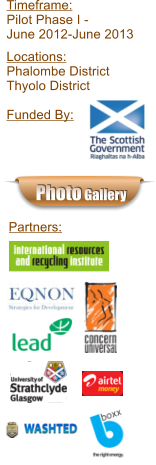“Rural Off-Grid Energy Kiosks” -
a pilot to identify a sustainable model for community electrification in Malawi

We have been blessed with a grant for a highly innovative pilot project under the Scottish Government Malawi Development Fund
2012/13 to be implemented in two Malawian communities, with 400 households as core pilot participants.
During the project, solar-powered energy kiosks were installed at Bvumbwe Court (Thyolo Distr.) and Dzenje Primary School (Phalombe
Distr.). These were developed into fully community-owned and -managed rental and charging stations for battery packs with inbuilt
charge controllers, together with compatible basic energy devices, e.g. mobile phone charging kits, LED lamps, tube lights, small low-power
TV screens for private households. There are even a limited number of laptop charging kits and complete solar sets
available to higher income households, centres/community institutions or small businesses.
Using participatory approaches and an intense preparatory and consultative process, the involved Field Facilitators supported the
community to elect an Energy Kiosk Committee with representatives of all existing community committees, and to identify and agree on
detailed procedures, eligibility criteria, regulations, risk mitigation action and sanctions. The committees were supported in recruiting
station staff in an open application process and to develop a maintenance plan, thus reducing the need for donor interventions & enhancing
self-help capacity. Community facilitation in Bvumbwe was undertaken by RENAMA, in Dzenje supported by Concern Universal outreach staff.
A side component of the project was the local electricity inventor competition. More information here.
The RurEnKi project had been set up with the aim of creating a distinct learning experience through thorough monitoring and documentation
all along. A first Best Practice Report has been created by the end of the pilot phase end June 2013. A number of stakeholder meetings, close
cooperation with related government departments, the District Committees and other local authorities, as well as ongoing consultations with
potential partners and investors for up-scaling as a self-sustainable business model are integral parts of the project concept.
General awareness raising on energy issues and the project processes and impacts were also enhanced through the creation of a documentary
movie on the project as well as an educational animation movie in the framework of the school competition, which can still be used in future
by schools and other educational projects.
RENAMA is the Malawian lead partner responsible for the overall implementation and coordination of the project locally. The consortium
for the pilot phase consisted of the Scottish project management partner, the International Resource and Recycling Institute (IRRI), as well as
local partners Eqnon, Concern Universal and LEAD South Eastern Africa. WASHTED/University of Malawi Polytechnic and the David
Livingstone Centre for Sustanability at the University of Strathclyde were associate partners.
Since the funding for the first pilot phase has phased out and the Energy Kiosks still need support and advice, the implementing partners
RENAMA, Eqnon and Concern Universal have agreed to further support the communities with regular monitoring and back-up support on
a voluntary basis and through an Advisory Board. An extension of the pilot project is currently in planning.











